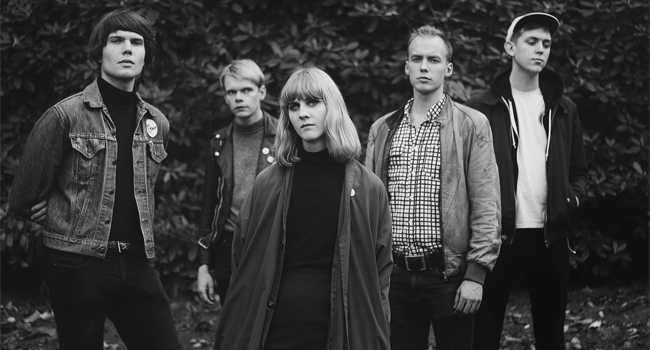 Not until someone opens the door, letting in a draft from the warehouse, does it become apparent just how stale it is in Dead Native’s practice space.
Not until someone opens the door, letting in a draft from the warehouse, does it become apparent just how stale it is in Dead Native’s practice space.
A plume of smoke hangs from the wooden rafters, across which a strand of blue Christmas lights is strung. Dozens of amplifiers, two drumsets, two ramp-sized pedalboards and six souls occupy the 10×10 room, a space they split with another, as of yet nameless, outfit. The band’s skin glistens with sweat, and cigarette butts line the floor. Lead singer/guitarist Zach Fox takes a swig of Diet Dr. Pepper, replacing it on the amplifier nearest him next to a High Life, a plastic handle of whiskey and a Dr. Pepper. “Normally, we have a wolf in the band,” says guitarist Blayke Jennings, “Never shown up once,” Fox adds, “He’s a good guy—it’s just—at the end of the day, he’s a wolf.”
Dead Native’s brand of hard psychedelia might bring to mind images of early twenty-something wasters; flaxen-haired, tuned in and spaced out. Actually the boys’ appearance is strikingly clean—collared shirts, leather boots, bomber hats and parted hairstyles—but perhaps most remarkably—there is a fourteen year age gap between bassist/vocalist Pete Prezzano (37) and drummer Arthur Velez (23), Fox and Jennings rounding out the bunch on either end of thirty. The tendency is to call this band “convenient” or a “weekends-only” type of gig, but every member of Dead Native is fully invested in its salvation—this is their band, not a project or side project.
And though they come from comically variegated musical backgrounds, “There is a commonality,” Prezzano says, “We wanted the band to be really loud.”
By now, everyone’s ears are numb, Fox has to shout song titles twice and the smell of mildew and sweat is dampened only by the smell of cigarettes. The four begin, sequentially, powering through the band’s forthcoming album Keep It Strange. The opening distorted hum of “Wait for the Sun” resonates so powerfully that the tone itself is almost inaudible, felt only in the vibration of your bones. Less than a year old, Dead Native has played five shows, all in Chicago, to an ever-growing crowd. Though it’s still hard to “discern between friends and new fans,” its telling that the band has found some of its biggest supporters behind the sound booth.
As is customary with Psych Rock, appeal arises not from originality of composition or technique, but in sonics. The band’s format is classic: four-piece, two guitars, bassist, drummer.
“You’re still gonna be put in a box,” Fox says, “But freak out hard enough that it’s gonna be tough for them to put you there.”
Dead Native’s is a dirty, heavy sound, but there’s also a cosmic airiness to it, creating a landscape at once alien and familiar with soaring harmonies, far away vocals and dream-like grooves. There is something unmistakably cosmic about the band. The way its song titles correspond to astronomical events, even the album art for Keep It Strange meshes the earthen with the sidereal—the way that the surface of Mars can appear as a cloudy Arizona.
Prezzano serves as a sort of sage to the band; his encyclopedic music knowledge has inevitably bled through the Dead Native’s aesthetic. He’s a veritable Timothy Leary of sounds, playing a hopelessly nuanced, niche selection of tunes during the interview at his apartment. Still, he keeps each of his thefts seamless, “Sonic cohesion” is his manifesto. It is possible to hear Black Sabbath in the brooding, percussive distortion of “How It Goes,” My Bloody Valentine in the undulating tones and hypnotic feel of “Shapes of Stars,” but its in recognizing these influences that one becomes aware that none nearly blankets the sound.
Though soft spoken, by his mates’ account, Prezzano is “the most prepared” in the creative process. He trades songwriting/vocal roles with Fox, his roommate, oftentimes penning the lyrics. Each member of the band mentions their mutual respect for one another. Though Fox could be called frontman, nobody downplays it more than him. In performance, he never stands center stage. Dead Native is an almost hopelessly democratic unit. Songwriting begins as simply with an idea anyone brings, tweaked and repeated to the point of droning. If the band’s sick of it—it moves on, without second thought.
What does Dead Native want from its compositions? Simply and impossibly, the feelings conveyed by the band members’ own favorite songs; finding what to play isn’t the difficulty, it’s finding what not to. While songwriting, Fox says, “You have a negative image of the song, that you feel, that will eventually show in full color what the song is.” Throughout Keep It Strange, one hears traces of the “negative image,” in the lonely, rolling arpeggios of the title track,
When asked about the peculiar namesake, the band lets on to less science than m
eets the eye. Fox and former drummer/founding member Andy Rohde were searching for names that matched the lock-heavy sound.
“We were playing around with ‘dead’,” Fox says, “Because what’s darker than ‘dead’?”
It’s immediately problematic, as so many bands have already invoked it. Finally, Fox spouted off “Native!” much to the chagrin of his partner. Why not? “Because it’s racist.” It was that visceral, emotional reaction that convinced Fox to keep it (though, by his own account, he never intended for it to be bigoted), true to the spirit of rock and roll.
The band is an act of discovery, a new experience for each member. Valez had been drumming in alt-country bands in his native Michigan, Jennings rarely escaped a “jam band” context, Prezzano runs an electronic music label (LoveAllDay) and Dead Native is the first occasion that Fox has performed with an electric guitar.
“We now know, vaguely,” Fox says, weighing his words like an astrophysicist discussing the fate of universe, “What the sound of the group is going to be.”
At no point is Keep It Strange an easy album. The namesake is key to its confusion. The track list is eight titles long, with a running time of over forty minutes, including three and a half minutes of opening ambiance. If there are any “safe” routes for a debut EP, this band has willingly foregone all of them. The lyric sheet is loveably bizarre, lines like “You walk on the water / You dress like your father” (“How It Goes”) offer a glimpse of Fox’s uneven easel. The word “strange” does not refer to what is impossible, only what is uncanny. Strange comes from a sort of uninvention; something completely familiar made completely foreign. Like the album, what one finds “strange” is often unsettling. To love the strange, it requires risk.
Dead Native veers from the sweet and comforting, to the chaotic and menacing. Though the band’s success is an unlikely story, even a strange one, in the past several months Psych Rock and its practitioners have seen a major return to fashion. This is to say nothing of the act’s timelessly tasteful rock and roll tendencies. There’s fearlessness in their trajectory, and, as Fox sings in the title track, “I don’t want to hide / Everybody hides”—a savage desire to get what they want.



